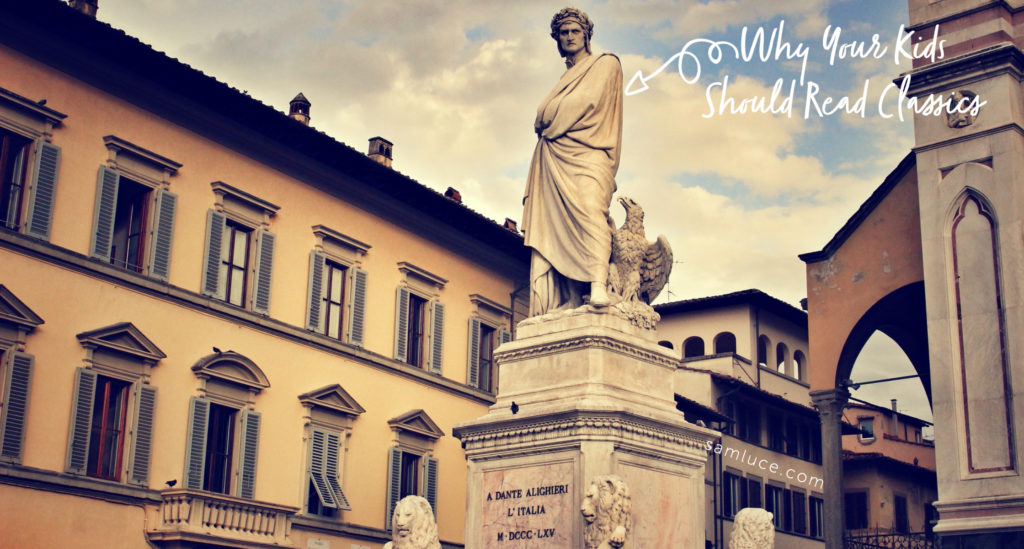We are at the start of summer, and each summer, I have my kids read a classic over the summer. Until five years ago, I had never read a work of classic literature. I recently graduated from Knox Seminary with a Masters Degree in Christian and Classical Studies. It was in the course of those studies that I have come to realize that everyone needs to read classics.
Why Should Kids Read Classics?
- They are being taught less and less each year in our public institutions.
- They cultivate imagination and foster a broader understanding of virtue.
In public school, classics have diminished over time. There are two fronts to this fight, and the classics are losing on both fronts. One front is the excessive push toward STEM programs at the expense of the humanities. The second front is due to what C.S. Lewis calls chronological snobbery. When Lewis spoke of chronological snobbery in his day. He was speaking to the idea that people of his time would read modern books that fit their modern sensibilities, political ideals, and social ideas. We are blind to the problems in our day. We can’t see what we can’t see. Lewis argues, and I would agree we need writers from decades, even centuries ago, to show us what we can’t see. One fix Lewis argues for is that we read one old book for every new book we read. This would help us be better readers in general and help us see what we can’t see on our own.
Our push for STEM programs has inadvertently lead to the diminishment of the humanities. We think we have evolved past those who came before us. We think we are wiser and more enlightened. What we can’t see through Bacon’s scientific method is our hearts have not evolved. Our hearts are sin-filled and desire the same things our great grandfathers and great grandmothers wanted. We see our world commit the same sins as our forefathers, only with a shiny new exterior. We think this is a new problem to be solved rather than an old sin to be repented of or an old heresy to be condemned.
Children need classics because classics help cultivate imagination and module virtue and vice. Kids need to see the world through the eyes of another. An appetite for the good, the true, and the beautiful found in classical works of literature is something every child needs. Our children need to see what we mean when we say have patience, be brave, or love well.
Dr. Karen Swallow Prior, Research Professor of English and Christianity and Culture at Southeastern Baptist Theological Seminary, believes this is a big deal with grave consequences.
“I see a lot of big issues facing the church today, but I think most of them result in one way or another from an impoverished imagination. For example, the division and polarization we are facing in the church and our larger culture owe in great part to our inability to imagine or empathize with opposing, or even simply different, perspectives. It’s not a stretch to see the lack of developed imaginations at play here.
Cognitive science shows that empathy increases among those who read literary fiction. Generally speaking, literature and other arts are not valued greatly in the contemporary church. Moreover, underdeveloped and unexercised imaginations make us more prone, ironically, to the lure of conspiracy theories. To be human is to have an imaginative capacity. Our imaginations will work, whether healthily or not. Imaginations that have been trained well in good, logical, well-constructed stories that make rational as well as aesthetic sense are less likely to be taken in by bad, false substitute stories.”
Dr. Karen Swallow Prior
In our overvalued love of the empirical sciences, we have undervalued the humanities, which greatly matters. Do we need scientists? Yes, but we also need virtuous scientists and who do what should be done rather than what can be done. Do we need doctors? Yes! But we need doctors who can empathize with the losses of others and be human, not just right. This isn’t just true of the scientific professions. I would argue we need pastors, theologians who are not just theologically precise but who are also virtuous and empathetic.
In the world we now live filled with information, and where everything is political, we need virtue, and we need empathy on levels never before seen. We need a generation of kids who can read a fairy tale and learn to see the world as it should be rather than blindly give in to the world as it is. The formation and catechism of our kids are taking place. If we are not intentional about their formation, someone will be. We have the privilege and responsibility to train our kids to see what is good, what is true, and beautiful. As Christians, we have the joy to show our children that every good thing we enjoy, including good books, is a fractured reflection of our perfect Heavenly Father.
A Few Tips in Picking Classics for Kids
- Pick a classic to fit their interests.
- Make sure the classic fit their reading level.
- Find a good classic. Not all classics are alike. Find one that has stood the test of time and one that promotes virtue.
- Talk about the book with your kids. Dr. Prior has some great-looking classics with an introduction by her that will help you have a conversation with your kids about what they have read. Leland Ryken also has a few guides to classical works that would be helpful as well.

